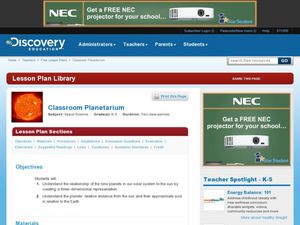Curated OER
On Jupiter
Students tour Jupiter. In this scenario based lesson, students examine the size of Jupiter and make models of the other planets in the solar system to show how large Jupiter is compared to the other planets.
Curated OER
Astronomy
Students complete a unit of lessons on our solar system, its stars, and astronomers. They record information in a space journal, design constellations, define key vocabulary, observe the phases of the moon, and create a group planet...
Curated OER
Planets in Balance
Students study the solar system by researching the planets. In this exploratory lesson students divide into teams and create mobiles.
Curated OER
Working on the Moon
Young scholars take a mission to the moon. In this space science activity, students visit selected websites to discover information about Earth's moon and the solar system. Young scholars may take virtual missions to the moon...
Curated OER
Earth
Fourth graders have a spatial awareness of the plants by orally discussing what they saw after they stepped out the model of the solar system. They recognize the similarities and differences between Earth and the other planets by being...
Curated OER
Astronomy
Students brainstorm about what they know about the solar system. They study a planetary fact sheet and create a Venn Diagram with the information. They work in groups to examine the names of the planets and information regarding each of...
Curated OER
Scavenger Hunt: Who am I?
In this space science worksheet, students use the sites listed on the Solar System and Planets page of the Kid Zone to locate the names of the people credited with each discovery. They identify and name 26 different scientists who made...
Curated OER
Make a Comet Model and Eat It!
Young scholars construct a comet model based on procedure provided. In this space science instructional activity, students compare the physical properties of comets to the models they made. They record their observations and share them...
Curated OER
Strange New Planet
Students simulate different spacecraft missions using materials provided. For this space science lesson, students observe and record a planetary model's features from a distance. They relate this activity to scientists' space exploration...
Curated OER
A View Of Home From The Front Door and From Space
Students discover how distance can change how our view of an object. Students build a representative model of where their home is located from different distances. They create three drawn models of their home from various elevations as...
Curated OER
NASA's Mars gamble pays off
Young scholars read an article about NASA and Mars and complete short answer questions about the article. In this Mars lesson plan, students also create a scale model of the solar system.
Space Awareness
Living in the Milky Way
Get to know our galaxy with an astronomy-themed, hands-on activity. Scholars watch an informative video, answer questions, and construct a model of the Milky Way in order to examine its contents and the distance inside it.
Space Awareness
Meet Our Neighbors: Sun
The sun isn't just a ball of yellow! Young scientists learn about the features of the sun using a hands-on modeling activity. They build models of the sun using common household items to represent sunspots, solar prominence, and the...
PBS
Why Isn't There an Eclipse Every Month?
Searching for an eclipse activity that sends scholars over the moon? Try an interesting interactive to get their minds active! The resource, part of an extensive Space series from PBS Learning Media, uses modeling and data analysis to...
University of Colorado
Spacecraft Speed
Space shuttles traveled around Earth at a speed of 17,500 miles per hour, way faster than trains, planes, or automobiles travel! In the 13th installment of 22, groups graph different speeds to show how quickly spacecraft move through...
Lunar and Planetary Institute
Oreo Moon Phases
Learning about the moon has never tasted delicious! Using the popular Oreo cookie as a model, young scientists carve out the cream filling to represent the different phases of the moon.
Curated OER
Solar System Planet Research
In this space science activity, students collect data that includes information in a chart or graph to display in a group. They identify and describe various planet features of a specific planet of choice. Students write notes and the...
Curated OER
Toilet Paper Solar System
Students create a model of the distances of the planets in the solar system using sheets of toilet paper and markers. Generally accepted orbital parameters are applied.
Curated OER
"Space" Investigations
Sixth graders understand the patterns of change observable on Earth as a result of the movement of the different bodies in the solar system. They identify the physical characteristics of the different components of the solar system.
Curated OER
A Model of the Sun's interior
Students create a three-dimensional model of the sun. In this solar system lesson, students design a scale model of the sun using plasticine.
Curated OER
Rolling Through Space
Seventh graders use a foll of toilet paper to visualize the vast distance that separates the sun and the planets of our solar system.
Curated OER
Classroom Planetarium
Students work in groups to create the planets of the solar system. In this planets lesson, students create a hanging solar system taking into account the size, shape and position of the planets. Students discuss the gravity...
NASA
Photons in the Radiative Zone: Which Way Is Out? An A-Maz-ing Model
Can you move like a photon? Young scholars use a maze to reproduce the straight line motion of a photon. The second in a six-part series of lessons on the sun has learners measure angle of incidence and refraction to determine the path...
Curated OER
Deep Impact's Comet on a Stick!
Students create a model of a comet. In this space science lesson, students compare their model to the characteristics of a real comet. They evaluate and make necessary modifications to their original design.

























